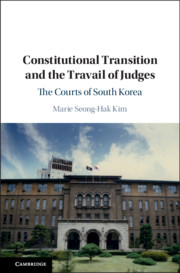Book contents
- Constitutional Transition and the Travail of Judges
- Constitutional Transition and the Travail of Judges
- Copyright page
- Dedication
- Contents
- Figures
- Tables
- Preface
- 1 Introduction
- 2 The Making of the Constitution and the Courts, 1945–1962
- 3 Jurisprudential Evolution, 1962–1972
- 4 The Yusin Era, 1972–1980 (1): The Laws
- 5 The Yusin Era, 1972–1980 (2): The Courts
- 6 The Yusin Era, 1972–1980 (3): The Judges
- 7 Political Transitions and Rule of Law, 1980–1987
- 8 Democracy and Travails of Judges, 1987 to the Present
- 9 Conclusion
- Bibliography
- Index
5 - The Yusin Era, 1972–1980 (2): The Courts
Published online by Cambridge University Press: 23 July 2019
- Constitutional Transition and the Travail of Judges
- Constitutional Transition and the Travail of Judges
- Copyright page
- Dedication
- Contents
- Figures
- Tables
- Preface
- 1 Introduction
- 2 The Making of the Constitution and the Courts, 1945–1962
- 3 Jurisprudential Evolution, 1962–1972
- 4 The Yusin Era, 1972–1980 (1): The Laws
- 5 The Yusin Era, 1972–1980 (2): The Courts
- 6 The Yusin Era, 1972–1980 (3): The Judges
- 7 Political Transitions and Rule of Law, 1980–1987
- 8 Democracy and Travails of Judges, 1987 to the Present
- 9 Conclusion
- Bibliography
- Index
Summary
This chapter examines the courts and jurisprudence under the Yusin Constitution.In his book on the “dual state” in Nazi Germany, Fraenkel showed how the prerogative state in the public law realm could coexist with the normative state in the private law realm. Fraenkel’s dual state theory offers important insight for the judicial process in Yusin Korea. Even with the existence of the emergency military courts, the regular justice system, criminal and civil, continued to function. In this situation, it was critical for the courts to maintain the ordinary business of the law, especially as long as the regime’s concern for legitimacy still committed it to at least a semblance of legality and judicial independence. The first part of the chapter discusses security cases, and the second part nonsecurity cases. In the height of the institutionalized arbitrariness of emergency rule, there were flourishing and sound jurisprudential activities taking place.
Keywords
- Type
- Chapter
- Information
- Constitutional Transition and the Travail of JudgesThe Courts of South Korea, pp. 159 - 204Publisher: Cambridge University PressPrint publication year: 2019

